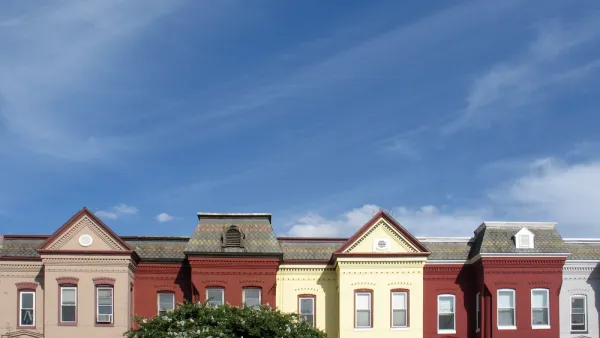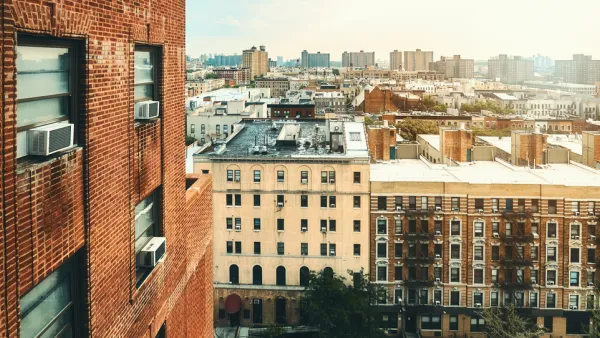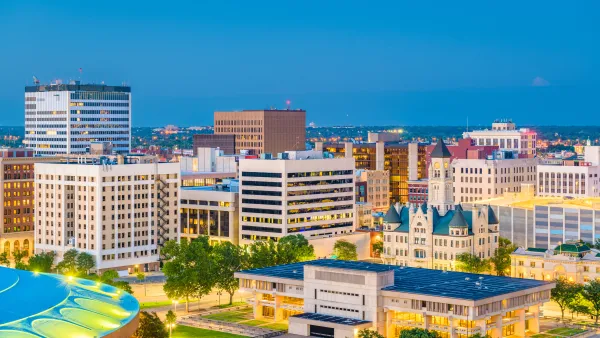School vouchers might expand educational choice and thus make city life more appealing to middle-class families—but the most appealing versions of a voucher system are also the most costly.

President Trump has proposed block grants for education vouchers—that is, grants for lower-income children so they can attend private schools. His choice for Secretary of Education, Betsy DeVos, has run into a buzz saw of opposition—partially because of her outspoken support for vouchers. Something like Trump's proposal (that is, vouchers for low-income students) has been tried in several big cities, including Washington, D.C., Milwaukee, and Cleveland. It is unclear how successful these programs have been at improving educational outcomes.
A more interesting question (to me) is: will private school vouchers* be good for cities? Will they cause families to shun suburban public schools and instead stay in cities?
Existing voucher systems do not seem to have had this effect, because they are targeted** toward lower-income families, some of whom live in cities only because they cannot afford suburbia. The nation's oldest voucher systems are in Cleveland and Milwaukee: both continue to decline.
But what if vouchers were expanded to middle- and upper-class families? It seems to me that cities would become far more popular with families. In many cities, parents move to suburbs to escape urban schools. If vouchers were expanded to private schools, parents would have little reason to avoid city neighborhoods: they could stay in the city and attend private schools at a low or nonexistent cost.
However, such a system would have some practical difficulties. The best private schools are more expensive than public schools. Public schools spend around $11,000 per student—about as much as the average private school tuition. (Urban public schools tend to spend a little more.) However, the private schools most appealing to well-off parents cost far more. For example, my nieces' private school in Atlanta costs a little over $20,000, as does the Atlanta private school that my siblings attended many years ago. In fact, the average nonsectarian private school is equally expensive. So if vouchers were to cover the entire cost of private school tuition, state and local education budgets (and presumably the taxes that fund those budgets) would increase.
On the other hand, if vouchers merely covered the cost of the average public school*** they might cover no more than half of the tuition of the best private schools—arguably not enough to discourage at least a few parents from choosing suburban public schools.
Thus, a state or city that supports vouchers as an anti-sprawl tool for the middle and upper classes (rather than as a tool to improve education for lower-income families) must either spend more money on education generally, or must adopt a stingier system that does less to promote city life.
*For the purpose of this post, I refer to "vouchers" as vouchers for private school attendance. A "public school voucher" program (that is, one limited to public schools but allowing open enrollment in all school districts in a state) has an entirely different set of pros and cons, and is best addressed elsewhere.
**With one major exception: in Indiana, voucher eligibility includes families with incomes as high as $90,000. But this expansion is only a few years old, so it is too soon to ascertain how it has affected Indianapolis (the state's largest city).
***Perhaps minus public schools' fixed costs, to reflect the fact that when a public school loses a child, it saves far less than the per-pupil cost, because some of the school's costs are fixed rather than variable.

Analysis: Cybertruck Fatality Rate Far Exceeds That of Ford Pinto
The Tesla Cybertruck was recalled seven times last year.

National Parks Layoffs Will Cause Communities to Lose Billions
Thousands of essential park workers were laid off this week, just before the busy spring break season.

Retro-silient?: America’s First “Eco-burb,” The Woodlands Turns 50
A master-planned community north of Houston offers lessons on green infrastructure and resilient design, but falls short of its founder’s lofty affordability and walkability goals.

Test News Post 1
This is a summary

Analysis: Cybertruck Fatality Rate Far Exceeds That of Ford Pinto
The Tesla Cybertruck was recalled seven times last year.

Test News Headline 46
Test for the image on the front page.
Urban Design for Planners 1: Software Tools
This six-course series explores essential urban design concepts using open source software and equips planners with the tools they need to participate fully in the urban design process.
Planning for Universal Design
Learn the tools for implementing Universal Design in planning regulations.
EMC Planning Group, Inc.
Planetizen
Planetizen
Mpact (formerly Rail~Volution)
Great Falls Development Authority, Inc.
HUDs Office of Policy Development and Research
NYU Wagner Graduate School of Public Service





























